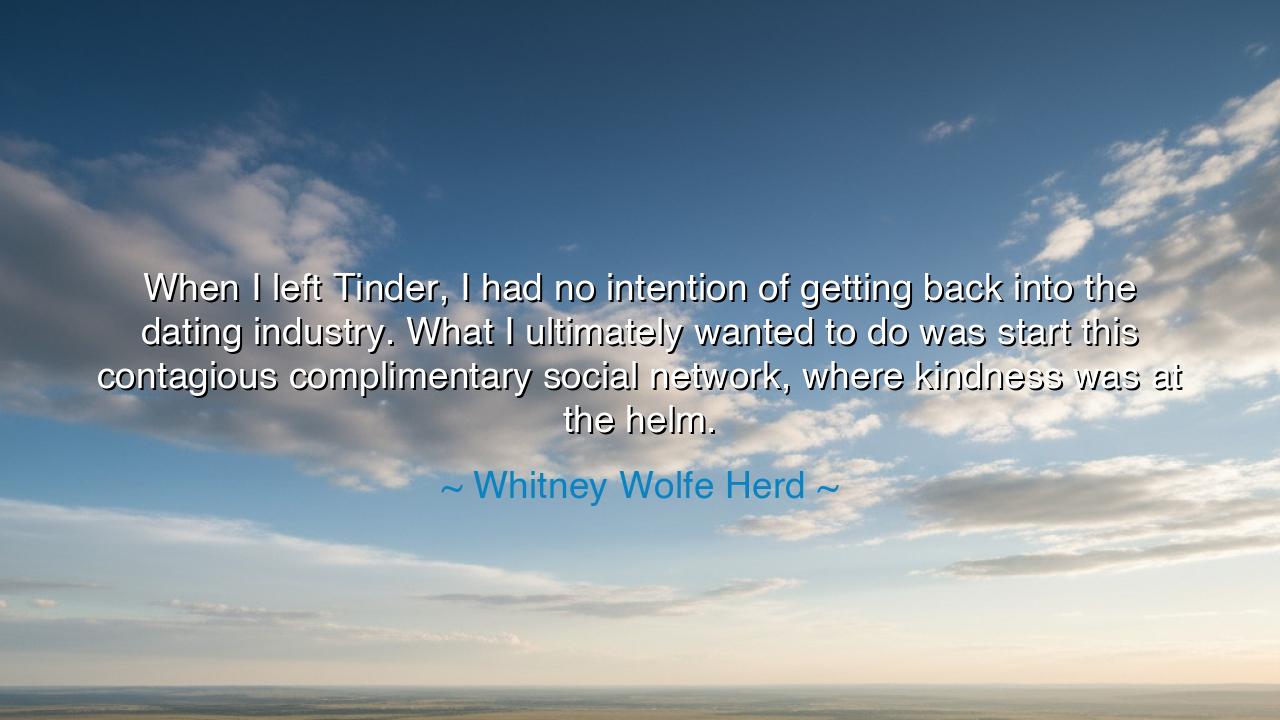
When I left Tinder, I had no intention of getting back into the
When I left Tinder, I had no intention of getting back into the dating industry. What I ultimately wanted to do was start this contagious complimentary social network, where kindness was at the helm.






In the words of Whitney Wolfe Herd, the visionary founder of Bumble, there is both humility and transformation: “When I left Tinder, I had no intention of getting back into the dating industry. What I ultimately wanted to do was start this contagious complimentary social network, where kindness was at the helm.” To many, these words may seem a reflection on business, on reinvention — but to those who listen more deeply, they are the voice of one who has passed through the fire of disillusionment and emerged with purpose purified by pain. Wolfe Herd speaks not only of rebuilding a company, but of reclaiming the soul of connection in a world that had forgotten its gentleness.
In the beginning, there was exhaustion — the kind known to every creator who watches their dream become distorted by the world’s greed and cruelty. Wolfe Herd’s departure from Tinder was not a step away from an industry, but from a culture of imbalance, where competition triumphed over compassion, and power often silenced kindness. Her desire to build a “contagious complimentary social network” was, in truth, a revolt against cynicism — a return to the ancient belief that all great societies must be built on ethos, on moral character, not manipulation. The ancients would have seen her not as a businesswoman alone, but as a reformer of hearts — one who sought to turn the market of love into a temple of respect.
In her words, “where kindness was at the helm,” we find the central flame of her philosophy. The ancients called this virtue philia — a love not ruled by passion, but by goodwill and fellowship. For all the advancements of modern civilization, the yearning for true kindness remains unchanged since the days of Aristotle, who taught that friendship based on virtue is the highest form of love. Wolfe Herd’s vision was to make technology serve this virtue, not oppose it. She sought to build a space where women could lead without fear, where men could connect without pretense, and where humanity could breathe again through the circuits of code.
Consider the story of Ashoka the Great, the Indian emperor who, after years of conquest, was broken by the sight of suffering he had caused. In remorse, he turned his empire from war to compassion, carving edicts of peace upon stone for all to read. In a way, Wolfe Herd’s transformation echoes his — from building an empire of attraction to cultivating a community of respect and empathy. Her rebellion was not loud, but powerful: a turning of the wheel from dominance to equality, from noise to understanding. Like Ashoka, she sought to prove that true leadership does not conquer — it uplifts.
The phrase “contagious complimentary network” holds a deep paradox, for it calls upon the wisdom of reciprocity — that kindness spreads by imitation. The Stoics taught that virtue is not taught by force, but kindled through example. A kind word inspires another; a generous act multiplies through unseen threads. Wolfe Herd’s vision, therefore, was not only to change an app but to change a culture — to make kindness not a weakness but a contagion, a force that spreads through hearts faster than cruelty ever could. In this, she stands among the builders of moral revolutions, those who dared to make goodness a strategy.
The lesson of her words is one of renewal and redirection. When the world becomes unkind, the noble do not flee from it; they rebuild it. When an industry loses its soul, the wise do not abandon the craft; they infuse it with new life. Wolfe Herd teaches us that when we find ourselves disillusioned by the paths we once walked, we must not curse them, but transform them. The true reformer is not the one who escapes the fire, but the one who enters it again — this time as light.
And so, let these words be a guide to all who create, lead, and dream: build with kindness at the helm. Let your ambition be married to empathy, your innovation to integrity. When you encounter a world driven by pride and competition, do not harden yourself — soften it. For as Wolfe Herd reminds us, the greatest revolutions are not born of anger, but of compassion that refuses to die. Kindness, when placed at the center of creation, becomes not a weakness but a force of renewal — a quiet, unstoppable tide that reshapes the world.






AAdministratorAdministrator
Welcome, honored guests. Please leave a comment, we will respond soon